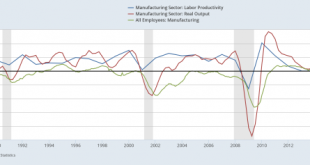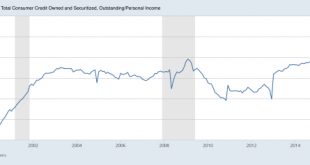from Lars Syll Keynes’s insights have enormous practical importance, according to Lance Taylor and Duncan Foley … But isn’t Keynes now mainstream? No, say Foley and Taylor. The mainstream still sees economies as inherently moving to an optimal equilibrium … It still says demand causes short-run fluctuations, but only supply factors, such as the capital stock and technology, can affect long-run growth. EVEN PAUL KRUGMAN, a self-described Keynesian, Nobel laureate, and New York Times...
Read More »(Modified) Irish national income Q1, 2017.
To circumvent the internationally approved rules of national accounting, irish economists developed new national income indicators: Modified Gross National Income and Modified Total Domestic Demand. They were right to do this. And these are not minor changes. Modified Income is almost a third (a third!) lower than ‘normal’ income. AlsoIn today’s quarterly results, the modified Total Domestic Demand indicator decreased by 2.7% in Quarter 1 2017, while the traditional indicator decreased by...
Read More »How rich would Bill Gates be without his copyright on Windows?
from Dean Baker Suppose we lived in a world where Bill Gates could not get copyright or patent protection for Windows and other Microsoft products. Anyone who wanted could duplicate these products without charge, sending Bill Gates a thank you note, if they were so inspired. In that world, Bill Gates would certainly not be the world’s richest human with a fortune of more than $70 billion. Even without copyright protection Mr. Gates would probably still be doing fine — he seems reasonably...
Read More »‘Money as electricity’ – redux
The heterodox heritage of economic statistics is underestimated. Too often I encounter the idea that heterodox economics does not provide an alternative to mainstream economics, let alone economic measurement. Ahem. Instead of ignoring (data on) unemployment (Robert Lucas!) or ignoring (data on) money and the monetary system (more on this below), it were heterodox economists who set out to measure it. To quite an extent, economic statistics are the heterodox alternative people want to...
Read More »Technology, employment, and distribution
from David Ruccio New technologies—automation, robotics, artificial intelligence—have created a specter of mass unemployment. But, as critical as I am of existing economic institutions, I don’t see that as the issue, at least at the macro level. The real problem is the distribution of the value that is produced with the assistance of the new technologies—in short, the specter of growing inequality. David Autor and Anna Salomons (pdf) are the latest to attempt to answer the question about...
Read More »The deadweight economy
Is there a decoupling of economic growth and use of materials? On the national scale: sometimes. On the global scale: absolutely not. From The Journal of Industrial Ecology: The international industrial ecology (IE) research community and United Nations (UN) Environment have, for the first time, agreed on an authoritative and comprehensive data set for global material extraction and trade covering 40 years of global economic activity and natural resource use. This new data set is becoming...
Read More »A new perspective on microfoundations
from Lars Syll Defenders of microfoundations and its rational expectations equipped representative agent’s intertemporal optimization often argue as if sticking with simple representative agent macroeconomic models doesn’t impart a bias to the analysis. I unequivocally reject that unsubstantiated view, and have given the reasons why here. These defenders often also maintain that there are no methodologically coherent alternatives to microfoundations modeling. That allegation is of course...
Read More »A job-killing robot for rich people
from Dean Baker In the last couple years, the financial transactions tax (FTT) has moved from a fringe idea to a policy proposal treated seriously by even the mainstream of the Democratic Party. The decision by Senator Bernie Sanders to make it a central part of his presidential campaign certainly helped, but a number of members of Congress, including Keith Ellison and Peter DeFazio, have also pushed FTT proposals for many years. The FTT is also gaining momentum overseas. There’s a push...
Read More »‘Til debt do us part
from David Ruccio Sometimes you just have to sit back and admire capitalism’s ingenuity. It’s able to make profits twice over. First, capitalists know that, when they keep workers’ wages down—even when there’s “full employment”—they can make spectacular profits. And, second, they can make additional profits by loaning money to those same workers, who are desperate to purchase goods and services and send their children to college, thereby financing the demand for the goods and services...
Read More »Krugman vs Syll on the IS-LM model
from Lars Syll Some time ago yours truly ventured to question Paul Krugman for his unadulterated devotion to the IS-LM model. For years self-proclaimed “proud neoclassicist” Paul Krugman had in endless harpings on the same IS-LM string told us about the splendour of the Hicksian invention. Krugman’s response contained nothing new. In an earlier post on his blog, Krugman had argued that ‘Keynesian’ macroeconomics more than anything else “made economics the model-oriented field it has...
Read More » Real-World Economics Review
Real-World Economics Review






